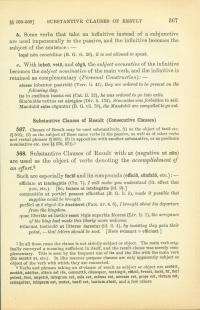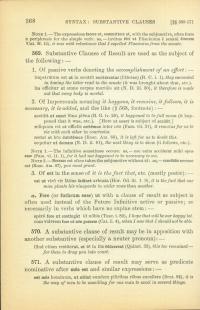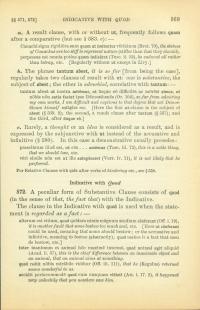567. Clauses of result may be used substantively, (1) as the object of faciō, etc. (§ 568, below); (2) as the subject of these same verbs in the passive, as well as of other verbs and verbal phrases (§ 569, below); (3) in apposition with another substantive, or as predicate nominative etc. (see §§ 570 - 571, below).1
568. Substantive clauses of result with ut (negative ut nōn) are used as the object of verbs denoting the accomplishment of an effort.2 Such are especially faciō and its compounds (efficiō, cōnficiō, etc.).
Efficiam ut intellegātis. (Clu. 7)
I will make you understand.
(lit. effect that you, etc.)
[So, faciam ut intellegātis (id. 9).]
commeātūs ut portārī possent efficiēbat (B. G. 2.5)
made it possible that supplies could be brought.
Perfēcī ut ē rēgnō ille discēderet. (Fam. 15.4.6)
I brought about his departure from the kingdom.
Quae lībertās ut laetior essetrēgis superbia fēcerat. (Liv. 2.1)
The arrogance of the king had made this liberty more welcome.
ēvincunt īnstandō ut litterae darentur (id. 2.4)
by insisting they gain their point, that letters should be sent.
[Here ēvincunt = efficiunt]
Note— The expressions facere ut, committere ut, with the subjunctive, often form a periphrasis for the simple verb.
Fēcī ut Flāminium ē senātū ēicerem. (Cat. M. 42)
It was with reluctance that I expelled Flaminius from the senate.
569. Substantive clauses of result are used as the subject of the following.
- Of passive verbs denoting the accomplishment of an effort.
Impetrātum est ut in senātū recitārentur. (litterae) (B. C. 1.1)
They succeeded in having the letter read in the senate.
(it was brought about that, etc.)Ita efficitur ut omne corpus mortāle sit. (N. D. 3.30)
It therefore is made out that every body is mortal. - Of impersonals meaning it happens, it remains, it follows, it is necessary, it is added, and the like (footnote 2, below).
Accidit ut esset lūna plēna. (B. G. 4.29)
It happened to be full moon.
(it happened that it was, etc.)
[Here ut esset is subject of accidit]Reliquum est ut officiīs certēmus inter nōs. (Fam. 7.31)
It remains for us to vie with each other in courtesies.Restat ut hōc dubitēmus. (Rosc. Am. 88)
It is left for us to doubt this.Sequitur ut doceam, etc. (N. D. 2.81)
The next thing is to show, etc.
(it follows)Note 1— The infinitive sometimes occurs.
Nec enim acciderat mihi opus esse. (Fam. 6.11.1)
For it had not happened to be necessary to me.Note 2— Necesse est often takes the subjunctive without ut.
- Of est in the sense of it is the fact that, etc. (mostly poetic)
Est ut virō vir lātius ōrdinet arbusta. (Hor. Od. 3.1.9)
It is the fact that one man plants his vineyards in wider rows than another.
a. Fore (or futūrum esse) ut with a clause of result as subject is often used instead of the future infinitive active or passive; so necessarily in verbs which have no supine stem.
Spērō fore ut contingat id nōbīs. (Tusc. 1.82)
I hope that will be our happy lot.
cum vidērem fore ut nōn possem (Cat. 2.4)
when I saw that I should not be able
570. A substantive clause of result may be in apposition with another substantive (especially a neuter pronoun).
Illud etiam restiterat, ut tē in iūs ēdūcerent. (Quinct. 33)
This too remained— for them to drag you into court.
571. A substantive clause of result may serve as predicate nominative after mōs est and similar expressions.
Est mōs hominum, ut nōlinteundem plūribus rēbus excellere. (Brut. 84)
It is the way of men to be unwilling for one man to excel in several things.
a. A result clause, with or without ut, frequently follows quam after a comparative (but see § 583.c).
Canachī sīgna rigidiōra sunt quam ut imitentur vēritātem. (Brut. 70)
The statues of Canachus are too stiff to represent nature.
(stiffer than that they should)
Perpessus est omnia potius quam indicāret. (Tusc. 2.52)
He endured all rather than betray, etc.
[Regularly without ut except in Livy.]
b. The phrase tantum abest [it is so far (from being the case)] regularly takes two clauses of result with ut: one is substantive, the subject of abest; the other is adverbial, correlative with tantum.
Tantum abest ut nostra mīrēmur, ut ūsque eō difficilēs ac mōrōsī sīmus, ut nōbīs nōn satis faciatipse Dēmosthenēs. (Or. 104)
So far from admiring my own works, I am difficult and captious to that degree that not Demosthenes himself satisfies me.
Here the first ut clause is the subject of abest (§ 569.2, above); the second, a result clause after tantum (§ 537); and the third, after ūsque eō.
c. Rarely, a thought or an idea is considered as a result, and is expressed by the subjunctive with ut instead of the accusative and infinitive (§ 580). In this case a demonstrative usually precedes:
praeclārum illud est, ut eōs . . . amēmus, etc. (Tusc. 3.73)
This is a noble thing, that we should love, etc.
vērī simile nōn est ut ille antepōneret (Verr. 4.11)
it is not likely that he preferred
For relative clauses with quīn after verbs of hindering etc., see § 558.
Footnotes
2.Verbs and phrases taking an ut clause of result as subject or object are accēdit, accidit, additur, altera est rēs, committō, cōnsequor, contingit, efficiō, ēvenit, faciō, fit, flerī potest, fore, impetrō, integrum est, mōs est, mūnus est, necesse est, prope est, rēctum est, relinquitur, reliquum est, restat, tantī est, tantum abest, and a few others.



